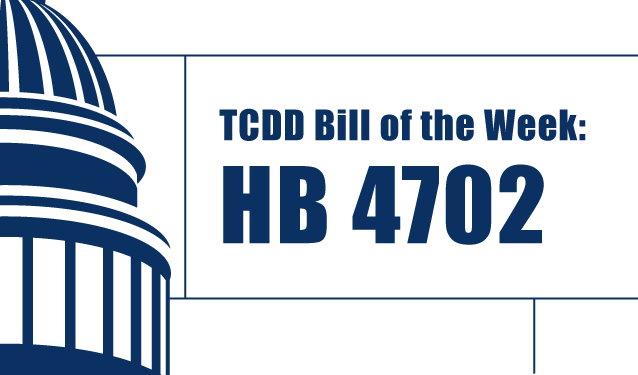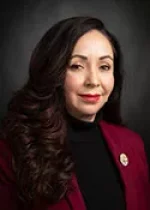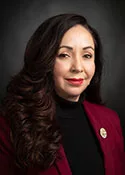HB 4702
HB 4702

For this weekly feature, we profile a noteworthy bill that is going through the legislative process. The bill may relate directly to TCDD’s Public Policy Priorities or another disability-related issue.
Table of Contents
Bill: House Bill (HB) 4702, relating to peer-support specialists for certain individuals with a developmental disability (DD) and peer services for those individuals under Medicaid.
Bill Author: Rep. Elizabeth “Liz” Campos, House District 119 (San Antonio)
Coauthors:
- Rep. Mihaela Plesa, House District 70 (Dallas)
- Rep. Josey Garcia, House District 124 (San Antonio)
- Rep. Penny Morales Shaw, House District 148 (Houston)
Share This Bill
We’ve created a Bill of the Week one-pager (PDF) for HB 4702. This is a simplified explanation of the bill that you can share with your representative and personal network.
Background
Peer supports are services where individuals are provided knowledge, experience, or emotional, social, and practical help by people with similar backgrounds, as defined by the Texas Health and Human Services Commission (HHSC). In 2017, the passage of HB 1486 created a new Medicaid peer services benefit and defined the training and certification of substance use and mental health peer workers. However, the bill did not provide Medicaid billing for peer-support services for people with DD.
Recently, TCDD funded grant projects to build peer-support networks for people with DD. Three grantees – Baylor College of Medicine, Imagine Art, and the University of Massachusetts Chan Medical School – have trained people with DD who live independently to serve as peer-support specialists for people receiving community-based services. There have been many notable outcomes from these grantee projects, such as:
- developing peer-support model curricula;
- establishing one-to-one peer supports to mentor people with disabilities transitioning from pediatric medicine to adult Medicaid services;
- creating a certification process for specialists, which was recognized by the HHSC peer services director as a potential foundation for state service models; and
- increasing self-advocacy and communication among individuals with DD.
These outcomes have clearly demonstrated the benefits of peer-support services for people with DD. The grantees have communicated with HHSC on the need to expand the Medicaid benefit to cover the services.
What does the bill do?
HB 4702 includes “peer support services provided to individuals with an intellectual or developmental disability” among the services available under Medicaid. The bill requires HHSC to develop and adopt rules to:
- establish accessible and validated training requirements;
- distinguish certification and supervision requirements;
- define the scope of services a DD peer-support specialist may provide;
- distinguish DD peer supports from other services that require a license or certification; and
- protect the health and safety of people receiving peer-support services.
The bill would also establish a work group of people affected by the legislation to provide input on these rules. The work group would be appointed by the HHSC executive commissioner and be comprised of the following people:
- One peer-support specialist focused on mental health and substance use disorder
- One peer support specialist focused on DD
- A representative from the HHSC Peer and Recovery Services Program, Planning and Policy unit
- A representative from the HHSC Office of Disability Services Coordination
- A representative from TCDD
- A representative from Texas Parent to Parent
- A representative from Texas Advocates
- A person certified as a trainer by the Texas Advocates People Planning Together program
The executive commissioner would designate one workgroup member as the presiding officer. Once established, the workgroup would meet once every month and would be abolished upon the adoption of the DD peer-support rules.
The bill specifies that the new rules would not apply to peer-support services provided to residents of state-supported living centers. If passed, HB 4702 would take effect on Sept. 1, 2023.


Statement from Rep. Liz Campos, bill author:
“People with IDD live with severe chronic conditions that are due to mental and/or physical impairments. The “peer-to-peer” services that we envision will help these individuals with their mobility, learning, speech, self-help, and independent living.”
Where is the bill in the process?
HB 4702 was passed out of the House on May 6. It has been referred to the Senate Health and Human Services Committee, where it awaits a public hearing.
The bill received a public hearing before the House Human Services Committee on April 18. You can watch the discussion on it here, beginning at the 2:10:35 mark.
Who supports the bill and why?
The following comments were provided at an April 18 hearing on HB 4702:
- CTD: Dennis Borel, executive director of the Coalition of Texans with Disabilities (CTD), testified in support of the bill. He explained how peer-support services are well established across the nation and utilized in 39 states. He noted that Medicaid does not cover Texas peer-support services for individuals with DD, something this bill would fix. Borel also highlighted the workforce issue that generally exists in all disability services, and how this bill would help “fill that gap in the workforce with fairly modestly paid positions by people who bring exceptional credentials to this field.”
- Texas Council of Community Centers: Isabel Casas, the government relations director for IDD Services for the Texas Council, provided testimony in favor of the bill. She explained how peer-support specialists are not only trained to assist individuals with DD but pull from their own lived experiences. This helps specialists navigate the stress and frustration that can come from social challenges, abuse, bullying, and other trauma. She pointed out that peers offer various types of assistance such as emotional support, knowledge, skills, honoring self-determination, and providing resources. Casas also noted that “increasing access to this service will provide individuals with IDD more resources to develop social skills while learning how to advocate for their own needs.”
- Peer-Support Specialist: Jordan Smelley, a certified mental health peer specialist and a person with DD, testified in support of the bill. Smelley shared that not every peer specialist in Texas has the personal lived experiences of DD, which can include delayed social skill development, navigating Medicaid home and community-based service waivers and Texas Workforce Vocational Rehabilitation programs, and challenges with the ability to recognize red flags, read nonverbal language, or understand the appropriateness of topics for different settings. He stated, “These are all things that not everyone with mental health or substance use [issues] have to navigate, but many people with IDD do.” Smelley suggested that peer specialists without these lived experiences can struggle to support someone with DD based on a lack of fully understanding their situation and that HB 4702 would address this problem.
The following groups also registered their support for HB 4702 but provided no testimony: The Arc of Texas, City of Uvalde, Clarity Child Guidance Center, Disability Rights Texas, Methodist Healthcare Ministries, NAMI Texas, National Association of Social Workers Texas, Texans Care for Children, Texas Parent to Parent, and United Ways of Texas.
Who opposes the bill and why?
Two individuals registered their opposition to HB 4702 but provided no testimony.
Additional Testimony
The following comments were offered at the April 18 hearing.
- TCDD: Lauren Gerken, a public policy analyst for TCDD, testified on the bill. Gerken explained how peer-support specialists are trained and certified to share lived experiences and offer guidance and support to help people meet their basic needs and find the best pathway to recovery. She noted that TCDD has funded projects to pilot DD peer support training models, which have been successful in improving communication, self-advocacy, and person-directed planning among individuals. In her written remarks, she pointed out that “peer support is not a novel concept … these practices are already available through home and community-based services for those with mental health needs, and those services can be replicated and adjusted for the IDD community.”
How much will the bill cost?
The Legislative Budget Board found that HB 4702 would not impact the state budget in a significant way.
Is there a Senate companion to the bill?
Senate Bill (SB) 2191 by Sen. Judith Zaffirini is identical to HB 4702. It was referred to the Senate Health and Human Services Committee but has not received a hearing.
Stay Informed
For the latest information about where HB 4702 is in the process, follow the bill on the Texas Legislature Online. To receive future legislative updates from TCDD follow us on Twitter, Facebook, Instagram, and LinkedIn.
Bill of the Week Updates
Here is an update on previous TCDD Bills of the Week for the 88th legislative session.
SB 477, which would improve accessibility for voters with disabilities, has passed out of the House Elections Committee. It awaits scheduling for consideration by the full Texas House.
HB 54 was voted out of the Senate Health and Human Services Committee and awaits consideration by the full Texas Senate. The bill would increase the personal needs allowance for residents of long-term care facilities.
HB 381 was passed out of the House and awaits referral to a Senate committee. The bill would prohibit the death penalty from being applied to a person with an intellectual disability.
HB 446, which would update the terminology used in law to refer to intellectual disabilities, has passed out of both the House and the Senate. It awaits the governor’s signature into law.
Lastly, HB 773, which would prohibit the practice of school-initiated undocumented early pickups, was placed on the House calendar for consideration but was not brought up by the May 11 deadline for the chamber to hear house bills. The bill is effectively dead for the session, though there is always a chance that the measure could appear as an amendment to another piece of legislation.
